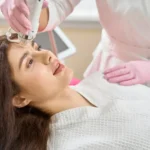When deciding between an optometrist or ophthalmologist near me, you should know the differences and which one is best for your situation.
An ophthalmologist is a medical doctor who specializes in vision care and the eyes. While ophthalmologists can perform eye exams and write prescriptions for eyeglasses and contact lenses, they will generally have more experience when it comes to eye diseases. An optometrist provides primary vision care and is not trained to perform any eye surgery. However, an optometrist can provide pre- and post-surgical care for you. An optometrist can diagnose eye diseases and then you need further care from an ophthalmologist.
For many people that just require a routine eye exam, both an optometrist and an ophthalmologist are qualified to handle your needs. Seeing an ophthalmologist or optometrist is a matter of personal preference. You should see an ophthalmologist near me if you experience any signs or have these risk factors for eye diseases.
Eye Conditions
- Decreased vision, even if it is just temporary
- New floaters or flashes of light
- Halos
- Eye pain
- An eye injury
- Red eye
- Double vision
- Excess tearing
- Eyelid abnormalities
Risk Factors
- Diabetes
- AIDS
- Family history of eye diseases, such as cataracts, macular degeneration, and glaucoma
- Thyroid diseases
- High blood pressure
Due to an increased risk for glaucoma, those of African descent should make an appointment with an ophthalmologist, even when there are no signs of eye disease or other risk factors. You should see an ophthalmologist if your primary care physician or optometrist refers you to one. Even if you don’t have any particular risk factors or problems, it’s still important to see an ophthalmologist at regular intervals. You should see one at newborn to three months, six months to one year, three years old, five years, and then later as needed. It’s important for children to see an ophthalmologist because it’s possible for your child to have serious vision problems or an eye disease without you being aware of it. It’s even more important if there is a family history of eye problems. Adults with no risk factors should have a screening completed by age 40. This is when early signs of eye disease and changes can start to happen. Based on the results of this initial screening, your ophthalmologist will let you know when you should return for any follow-up exams. Adults who are 65 years old and older should see an ophthalmologist every one to two years, or as recommended.
If you are interested in having any vision correction surgery, such as LASIK, then you need to see an ophthalmologist. Most eye surgeons do work closely with an optometrist for screening and care for surgical patients.










